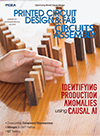News
Metcal (Menlo Park, CA), a division of OK International, has introduced a compact, portable two-arm fume extraction system that combines strong fan performance with efficient filtration and quiet operation. Metcal enlisted the fume extraction expertise of Impell, another OK International division, to develop the system.
Building on Metcal's existing single arm system, the new unit features the same motor as the single-armed model, but has a one-stage impeller design that provides more than double the total free-blowing airflow. A proprietary impeller was chosen to maximize performance while keeping size and weight to a minimum. The result is a unit that can be easily transported by one person without strain.
Maximum free-blowing airflow is rated at 250m3/h, with maximum suction force at 850Pa. The 850Pa rating provides capability to handle any clogging that occurs during normal filter life.
The system's pre-filter is the best in class for this type of portable fume extraction system, while the main filter offers HEPA efficiency of more than 99.5% and an activated carbon filter.
The filtration system features a significant amount of activated carbon and a large filter area, to provide a long filter life and protection against clogging. The activated carbon makes the unit efficient at filtering gases.
The filter system has been designed to allow the pre- and main filters to be changed individually. The filters can be changed by undoing a latch on the side of the unit.
In operation, the stand-alone unit does not require a separate compressor or external ducting; it only needs to be plugged into a power source to be ready for use. The unit is designed for a universal power supply ranging from 100 to 240 VAC and 50 or 60Hz.
The unit is compact enough to be located under, or next to, the workbench. It can be used with either two 2-in. (50-mm) diameter hoses and BVX arms, or one 2.5-in. (67-mm) hose and an Omniflex arm. The single arm offers a 50% higher airflow than one of the smaller arms, with airflows per arm rated at 75m3/h and 110m3/h respectively.

Copyright 2004, UP Media Group. All rights reserved.
New Venture Research (NVR), a U.S. market research and business development firm in the electronics industry, announced a joint venture with E. J. McKay & Co. (Shanghai, China), a corporate strategy and mergers and acquisitions advisory group, to assist original equipment manufacturers (OEMs) and contract manufacturers (CMs) in developing China solutions.
Given the strong interest in outsourcing manufacturing production to China today, the two firms are bringing together their skills and resources to assist electronics companies in identifying Chinese partners, acquisition targets and facilitating joint ventures. NVR and E. J. McKay recently collaborated in writing a syndicated market research report, "Electronics Manufacturing in China" that is published by Electronic Trend Publications.
"Companies needing a low-cost manufacturing solution sometimes do not know where to begin," said Randall Sherman, chief executive officer of NVR. "While NVR is recognized for providing business intelligence in China and other regions, companies often need a skilled and local advisory firm in the country to assist the transaction, perform due diligence and guide them through the legal and cultural channels. E. J. McKay perfected our offering of capabilities for clients in the U.S. and Europe. We thought it best to formalize a program that clearly addressed a China solution for a broader audience."
James Li, Managing Director of E. J. McKay, said, "While our company is a leading strategy and M&A advisor in China and India, we wanted to achieve more visibility and reach in the U.S. market for companies wishing to enter the China."
NVR and E.J. McKay indicate that the China Solutions program provides services in search, qualification, due diligence and transaction execution of mergers and acquisitions, joint ventures, Greenfield and other forms of vehicles. In particular, the program assists electronics companies through three critical stages: providing critical strategic business intelligence; assistance in identifying/choosing suitable Chinese business partners; and advising and facilitating the execution of M&A transaction.
Copyright 2004, UP Media Group. All rights reserved.
Indium Corp. (Utica, NY) has introduced PK-001 and PK-002 flip chip epoxy fluxes designed for use with Sn62 and Sn 63 eutectic solders. The fast curing, halide-free, no-clean fluxes can be used for flip chip or chip-scale package (CSP) soldering processes.
The fluxes have a stable thermoset residue, compatible with standard underfill materials, conformal coatings and most finishes and coatings. They are also environmentally friendly.
Many effective methods can be used to apply the fluxes, such as pin transfer, stencil printing, dispensing or dipping techniques.
Contact Indium Corp. to obtain a copy of the product data sheets.
Indium Corporation is a supplier of electronics assembly materials, including solder pastes, solder preforms, fluxes, lead-free solder alloys, underfill materials and die-attach materials.
Copyright 2004, UP Media Group. All rights reserved.
Press Releases
- Pushed by glass core and high-end ICs substrates for AI, the advanced IC substrate market reaches $31 billion by 2030
- Pushed by glass core and high-end ICs substrates for AI, the advanced IC substrate market reaches $31 billion by 2030
- Ryder Vietnam - Phase 2: Building resilience and meeting demand
- Scanfil and Etteplan deepen their strategic partnership into production testing


